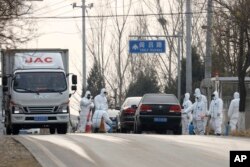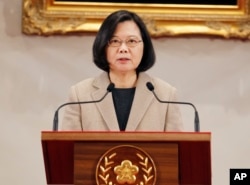A hog evidently tossed into the ocean from China washed up on New Year’s Eve along Kinmen, an outlying Taiwanese-held islet. Local agricultural inspectors later tested the carcass positive for African swine flu, an infectious disease that has led to the slaughter of some 600,000 pigs in China.
Dispose the animal and move on? Not so fast. The mid-sized, brownish hog quickly became not just a household media image in Taiwan but also a new issue showing the depths of an icy impasse between the leaders of Taiwan and China.
Taiwan wants China to turn over more information about the hog so authorities in Taipei can help stop the deadly swine flu from reaching its own giant pork industry.
China hasn’t answered a letter from Taiwan’s Council of Agriculture about the pig or said much else. Communist leaders see self-ruled Taiwan as part of their turf, not a separate country, and won’t talk about anything at all unless the government in Taipei agrees that the two sides belong to a single China.
“I can only speculate, but when relations are better, Beijing would definitely first give Taiwan a heads up and say ‘here's how things are,’” said Huang Kwei-bo, vice dean of the international affairs college at National Chengchi University in Taipei.
China and Taiwan have been ruled separately and seldom gotten along since the Chinese civil war of the 1940s, when Chiang Kai-shek’s Nationalists lost to Mao Zedong’s Communists. The fleeing Nationalists rebased their government in Taiwan. More militarily powerful China still insists that the two sides eventually unite.
Swine flu risk
Taiwan went on guard against a spillover of African swine flu after China confirmed its first case in August. The disease had caused 81 cases in 21 Chinese provinces as of early December, Beijing’s official Xinhua News Agency says.
Taiwan braced because its main island lies just 160 kilometers southeast of China and the carcass reached an islet that’s just 10 kilometers away.
An outbreak of African swine flu would “devastate” Taiwan’s $2.59 billion pig farming industry, the government-funded Central News Agency reported. China’s Xinhua calls the outbreaks “generally under control.”
Airport authorities in Taiwan were already stepping up penalties against passengers who bring in meat before the pig carcass washed up – followed by another carcass on a different outlying islet that turned out not to be infected.
In Taipei on Jan. 1, President Tsai Ing-wen used her annual New Year speech to demand information from China. Her government’s spokeswoman Kolas Yotaka asked in a Friday Facebook post whether the second pig was a “biochemical bomb” from China.
Tsai visited Kinmen herself Friday as her government began a 14-day ban on pork products from being shipped to Taiwan proper.
Health politics
“The other side’s government has never, according to agreements, given honest and timely reports on the outbreak to Taiwan,” Tsai said in her speech.
“Once African swine flu gets into Taiwan, it would not only give a bit hit to related industries and impact the people’s economy, but more importantly it would cause Taiwan people to have a negative view of the other side,” she added. “We don’t look favorably on that situation happening.”
Tsai’s party advocates long-term autonomy for Taiwan, not Beijing’s goal of unification. China has hit back since Tsai took office in 2016 with military flybys, a heisting of diplomatic allies and cuts in Taiwan-bound group tourism.
The Beijing government’s Taiwan Affairs Office said in late December it does not need to provide outbreak info under a 2010 two-way agricultural inspection deal because Taiwan does not allow Chinese pork imports.
Taiwan officials are “politicizing” the hog carcass, said Yun Sun, East Asia Program senior associate at the Washington D.C.-based Stimson Center think tank. But China should not put politics before health, she said.
“I think that’s something that’s very wrong,” Sun said. “You cannot use this issue as a political bargaining chip and force the other side or punish the other side for not accepting a political condition.”
Hog or no hog, China and Taiwan went after each other much of last week over politics.
Chinese President Xi Jinping said Taiwan and China must unify and didn’t rule out use of force to make that happen. Tsai responded in some of her toughest language yet toward China that she rejects China’s idea that both sides belong under one flag as well as Xi’s suggestion that China govern Taiwan as it rules Hong Kong, with a degree of local autonomy.










